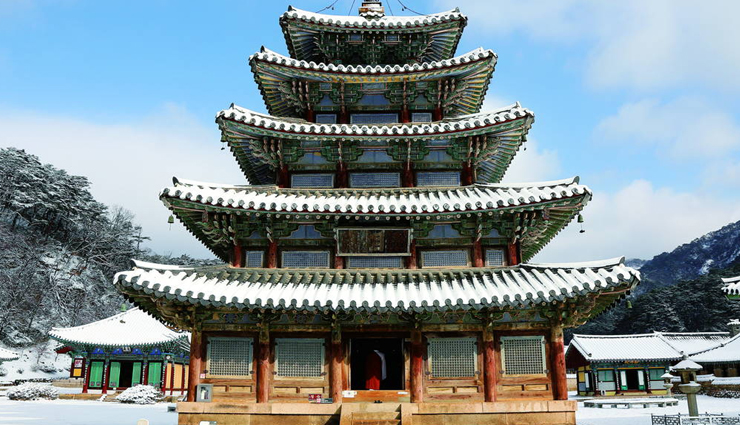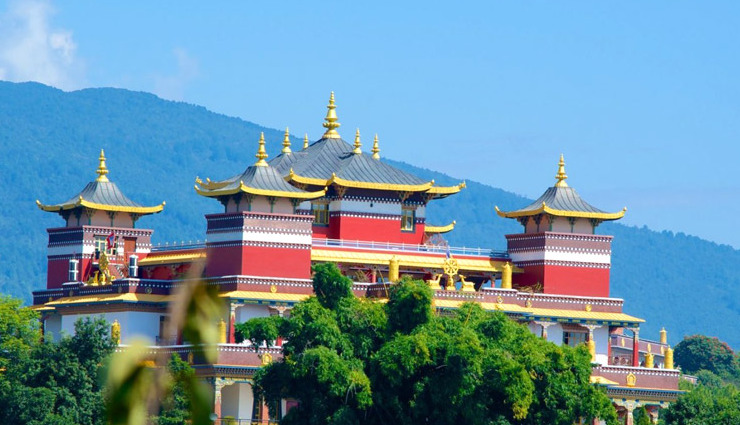
This spiritual tradition began centuries ago and remains vibrant to this day. A trip to Nepal is not just about visiting awe-inspiring monasteries; it is about embarking on a life-changing experience.

Kopan Monastery, a Tibetan Buddhist retreat perched atop a hill, is one of the most frequented monasteries in Nepal. It attracts a large number of visitors every year who come to study Buddhism and meditation. Founded by Lama Thubten Nohe, Kopan offers courses on topics such as Mind Training, Karma, Death and Dying, Bodhicitta, and many others. These courses range from 5 to 30 days, with specialized sessions on Tibetan medicine and Thangka painting.
Located on Druk Amitabha Mountain, the Amitabha Monastery serves as both a spiritual center and a hub for humanitarian efforts. The monastery features a hall that can accommodate up to 2000 people, a library, and offices for the Drukpa Lineage. It provides shelter for animals spared from slaughter and includes vegetable gardens. The surrounding hiking trail offers breathtaking views, and the peaceful atmosphere conveys a powerful message of tranquility and patience.
Lumbini, the birthplace of Lord Buddha, holds immense historical and spiritual significance. As a major pilgrimage site for Buddhists, it is surrounded by marshlands and has a serene atmosphere. Emperor Ashoka visited Lumbini in the 3rd century BC, marking the spot with a pillar that inscribed Buddha's birthplace. The area, spanning 4.8 km, is filled with temples, monasteries, and ancient ruins. Lumbini is also home to the sacred Bodhi tree, and its image is featured on Nepal’s 100-rupee note.
Established by Rabjam Tenpai Gyaltsen, Shechen Monastery became one of the six major Nyingma monasteries in Tibet. It was known for its spiritual purity, with notable hermits and teachers. The monastery offers exceptional philosophical education and has been home to many great masters. Despite being destroyed during the Chinese invasion in 1957, it was later restored with the help of Dilgo Khyentse Rinpoche in 1985.
Also known as Seto Gomba, the White Monastery is a peaceful Buddhist retreat offering both religious significance and natural beauty. Visitors can enjoy stunning sunrises and sunsets amidst lush greenery, with panoramic views of the Kathmandu Valley. Its tranquil atmosphere is perfect for meditation, providing a serene escape for those seeking peace.
Situated on a hill to the west of Kathmandu, the Swayambhunath complex is home to a grand stupa and numerous shrines. The temple is adorned with gold decorations and vibrant prayer flags, while the sacred site also hosts hundreds of monkeys, believed to be holy by Hindus and Buddhists. The legend of Manjushree and the transformation of lice into monkeys adds a mystical element to this revered site.
Boudhanath Monastery, one of Nepal’s largest stupas and the largest in the world, is located about 11 km from Kathmandu. A UNESCO World Heritage Site since 1979, the Boudhanath Stupa is a large dome topped with a Buddhist pyramid tower. It is considered a central point of Buddhist worship and has long been a symbol of Buddhist faith. The surrounding temples and holy sites further enhance its spiritual power.
Perched at 3,800 meters above sea level on Wangbori Mountain, Ganden Monastery is the first and most significant religious community of the Gelug Sect in Tibetan Buddhism. Built in 1409 by Je Tsongkhapa, this monastery remains a powerful center of spiritual reflection and growth.
Drepung Monastery, located at the foot of Mount Gephel, is the largest Tibetan monastery, once home to over 7,000 monks. Situated 5 kilometers west of Lhasa, it was a major center of Buddhist learning. Although it has faced political challenges since the 1950s, Drepung still houses numerous cultural relics, including statues of the Manjushri Bodhisattva and Sitatapatra.
Sera Monastery, one of Tibet’s six Gelugpa monasteries, is renowned for its educational role in Buddhist philosophy. Built by Jamchen Chojey Sakya Yeshe, it features a large courtyard where monks engage in lively debates, accompanied by the chanting of Buddhist scriptures. The monastery’s murals, library, and printing press offer a comprehensive understanding of its rich history and spiritual practices.